We need your consent to use the individual data so that you can see information about your interests, among other things. Click "OK" to give your consent.
ASTM D7896-14
Standard Test Method for Thermal Conductivity, Thermal Diffusivity and Volumetric Heat Capacity of Engine Coolants and Related Fluids by Transient Hot Wire Liquid Thermal Conductivity Method
STANDARD published on 1.2.2014
The information about the standard:
Designation standards: ASTM D7896-14
Note: WITHDRAWN
Publication date standards: 1.2.2014
SKU: NS-39249
The number of pages: 6
Approximate weight : 18 g (0.04 lbs)
Country: American technical standard
Category: Technical standards ASTM
The category - similar standards:
Annotation of standard text ASTM D7896-14 :
Keywords:
anhydrous, aqueous engine coolants, heat transfer fluids, non-aqueous engine coolants, specific heat capacity, thermal conductivity, thermal diffusivity, volumetric heat capacity, waterless, ICS Number Code 71.100.45 (Refrigerants and antifreezes)
Additional information
| Significance and Use | ||||
|
5.1 This test method covers the measurement of thermal properties for engine coolants (aqueous or non-aqueous) and related fluids. 5.2 With each single measurement,
the thermal conductivity (λ) and thermal diffusivity (α) are
measured directly, and volumetric heat capacity (VHC) is determined
by the relationship: 5.3 The test method is transient and requires only a small amount of specimen and a short duration of time (0.8 s) to run a measurement. These attributes minimize heat convection in the liquid. 5.4 The brief application of current to the sensor wire adds very little heat to the test specimen and ten repetitive tests may be applied at 30-s intervals without causing any significant convection or temperature drift. |
||||
| 1. Scope | ||||
|
1.1 This test method covers the use of a transient hot wire liquid thermal conductivity method and associated equipment (the System) for the determination of thermal conductivity, thermal diffusivity and volumetric heat capacity of aqueous engine coolants, non-aqueous engine coolants, and related fluids. The System is intended for use in a laboratory. 1.2 The System directly measures thermal conductivity and thermal diffusivity without the requirement to input any additional properties. Volumetric heat capacity is calculated by dividing the thermal conductivity by the thermal diffusivity of the sample measured. 1.3 This test method can be applied to any aqueous or non-aqueous engine coolants or related fluid with thermal conductivity in the range of 0.1 to 1.0 W/m∙K. 1.4 This test method excludes fluids that react with platinum. 1.5 The range of temperatures applicable to this test method is –20 to 100°C. 1.6 This test method requires a sample of approximately 40 mL. 1.7 The System may be used without external pressurization for any fluid having a vapor pressure of 33.8 kPa (4.9 psia) or less at the test temperature. 1.8 For a fluid having a vapor pressure greater than 33.8 kPa (4.9 psia) at the test temperature, external pressurization is required (see Annex A2). 1.9 The values stated in SI units are to be regarded as standard. No other units of measurement are included in this standard. 1.9.1 Exception—Inch-pound units are provided in 1.10 This standard does not purport to address all of the safety concerns, if any, associated with its use. It is the responsibility of the user of this standard to establish appropriate safety and health practices and determine the applicability of regulatory limitations prior to use. |
||||
| 2. Referenced Documents | ||||
|
Similar standards:
Historical
1.11.2009
Historical
1.3.2011
Historical
1.10.2011
Historical
1.5.2013
Historical
1.4.2014
Historical
1.10.2012
We recommend:
Technical standards updating
Do you want to make sure you use only the valid technical standards?
We can offer you a solution which will provide you a monthly overview concerning the updating of standards which you use.
Would you like to know more? Look at this page.



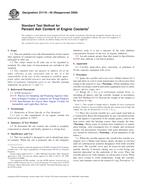 ASTM D1119-05(2009)..
ASTM D1119-05(2009).. ASTM D1120-11e1
ASTM D1120-11e1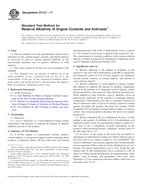 ASTM D1121-11
ASTM D1121-11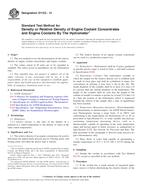 ASTM D1122-13
ASTM D1122-13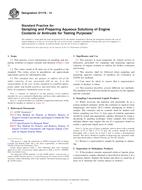 ASTM D1176-14
ASTM D1176-14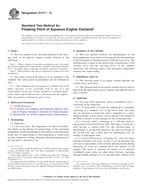 ASTM D1177-12
ASTM D1177-12
 Cookies
Cookies
